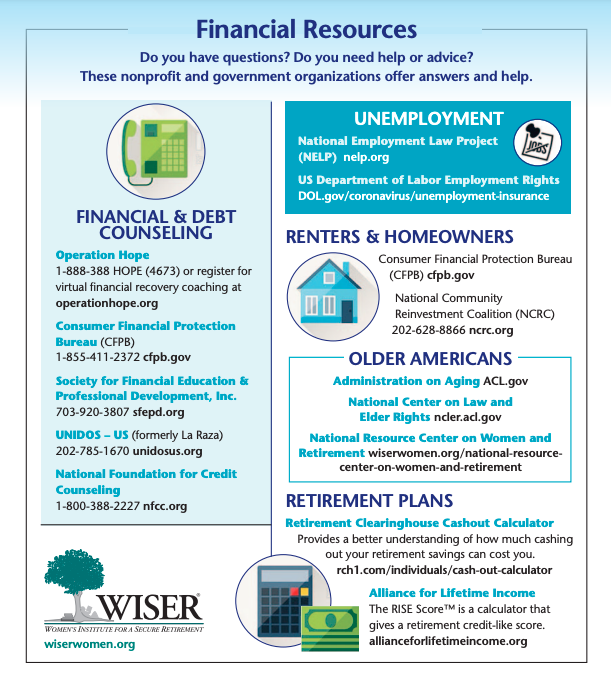
Programs to get more help while on SSI:
Explore programs that help you save money and take care of basic needs while on SSI.

Legal Agreements for Families and Caregivers
There are an estimated 53 million adult caregivers in the United States and nearly one in five (19%) are providing unpaid care to an adult
Traditional Individual Retirement Accounts (IRAs)
An Individual Retirement Account or IRA provides a convenient way for all working people to save for their retirement. A traditional IRA is a tax-deferred
How to Find a Financial Planner
Many people learn about financial planning by reading. They cull through the financial pages in newspapers or online and read financial magazines and books. But

Supplemental Security Income for a Special Needs Adult Child
More than one-third of those eligible for Medicaid who are living with a disability are recipients of Supplemental Security Incomes (SSI) which is the federal cash assistance program for older adults and people living with disabilities that are low-income (MACPAC).
SSI provides monthly payments to adults and children living with a disability or blindness who have income and resources below specific financial limits. Learn about SSI eligibility pathways for people with disabilities here.
Learn how to apply for SSI.

5 Things Mothers Should Tell Daughters about Money and Retirement
Older women have a wealth of experience and information to offer to younger women. WISER encourages all mothers, grandmothers and other women to share their money experiences with a daughter, granddaughter or another young woman in their life. Helping a young woman develop a strong financial plan is a lifetime gift.
Guides for “Managing Someone Else’s Money”
The “Managing Someone Else’s Money” guides can help you understand your role as a financial caregiver, also called a fiduciary. Each guide explains your responsibilities
Creating a Household Budget
Caregiving can involve increasing household and medical expenses depending on the care your parents need. Small expenses add up quickly and could prevent you from saving enough for your own retirement.
Especially if you are considering reducing your hours at work or quitting a job, a household budget is essential. It will help you decide how to adjust your lifestyle and expenses depending on your individual expenses and what you think your parent will need.
As your parent’s caregiver, you may also help manage their budget and finances. Keeping careful track of spending is a way to protect yourself from false allegations of financial exploitation. It can also prevent future family conflicts over what was spent and why. The Consumer Financial Protection Bureau has Managing Someone Else’s Money guidebooks that can also help.
- Buy a small notebook and take it with you everywhere you go for one month. Write down everything you spend money on, from the smallest “odds and ends” to larger purchases.
- After a few weeks, put your expenses into categories, like food, transportation, and clothing. You may be surprised, for example, how much you spend on food when eating out.
- Make a list of bills you have to pay on a regular basis like car insurance, rent or mortgage payments, dental checkups, and gifts.
- Study your credit card statements and bank statements to make sure you have included (accounted for) everything. Make sure you have included time-sensitive items like:
- Health insurance premiums
- Requirements for health insurance enrollment periods
- Filing income taxes or requesting an extension
- Any real estate taxes
- Utility bills
- Mortgage payments
- Add up your total income—all the money you receive in salary, other payments and benefits and any earnings on investments each year. Divide your annual income by 12 to calculate your monthly income.
- Subtract all your regular monthly bills and the other expenses that you found by keeping track of your spending in your notebook.
- Use a Monthly Budget Template like WISER’s to start this method of tracking your expenses.
- If your income is not covering your expenses, find ways to cut back and reduce your debt. Listing all your expenses will help you think of ways to economize.
- Look at NCOA’s Benefits CheckUp tool to find other ways of supplementing your income or reducing household expenses.
- If you have expensive debt like credit card debt, it is important to figure out a plan for paying it off. This will help your long-term financial future. Read WISER’s page about debt warning signs and what to do about it.
- If you find yourself picking up expenses for your parent, be sure to track these expenses and include them in your monthly budget. You may want to consider other options such as asking other family members to help with expenses.
Planning for Medical Expenses
Depending on your parent’s caregiving needs, you may need to plan for current or future medical expenses. These can take up a large portion of household income. But there are resources and strategies you can use to help pay for the care your parent’s needs.
Long-Term Care Insurance is a type of insurance that you can buy to pay for long-term care services your loved one might need:
- daily care and health care services that might allow them to stay in their own home when they are no longer able to do certain things themselves, or
- The resources to choose an assisted living facility or nursing home.
Medicare and Medicaid are public long-term care insurance, but they only cover some care if individuals meet specific requirements. Private long-term care insurance can cover more but must be purchased. Read WISER’s Long-Term Care Insurance post to learn more about this form of insurance.
Older adults can spend a significant amount of money out-of-pocket on necessary prescriptions. But there are different strategies and subsidies to help pay for medication. Visit NCOA’s Prescription Assistance for Caregivers page to review tips on help paying for your parent’s medication.
Unexpected medical bills are one of Americans’ greatest worries. But surprise medical billing can happen when an out-of-network provider gives your loved one care in an emergency or in a situation where you do not realize the provider is not in-network. AARP has created A Survival Guide to Surprise Medical Bills (also available in Spanish) for caregivers who must take care of surprise billing for their loved ones. Review their tips and resources to deal with big health care bills.
A lesser known issue is that some adult children could be forced to pay for their parents’ long-term care through state “filial responsibility” laws, which require adult children to support their parent if the parent does not have the money to pay for the care. More than half of states as well as Puerto Rico have such laws, which require adult children to provide necessities such as food, clothing, housing and medical attention to an indigent parent. The laws vary, but generally do not require children to provide care if they do not have the ability to pay. The laws have rarely been enforced, but that could change as states cope with the increasing burden of nursing home costs on Medicaid budgets.


